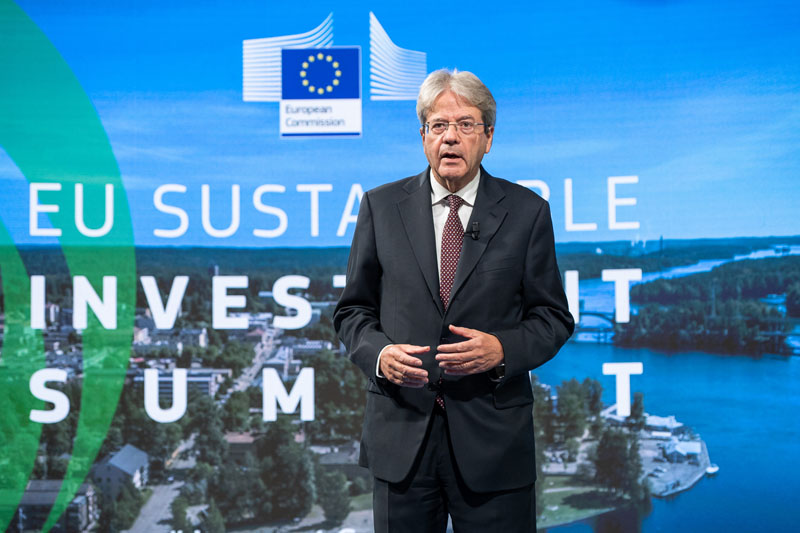Strategic investments in the years to come
The session discussed sectors’ priorities and investment needs during the recovery period and in the years to come. Speakers exchanged views on the opportunities at hand for strategic investments and for alliances led by the public and private sector.
Commissioner for the Economy Paolo Gentiloni gave the introductory speech, recalling the initiatives that the EU is taking to finance the green transition. “A historical task lies before us”, he stated, highlighting that all those initiatives have one thing in common: massive investment and financing needs for the years to come.

He recalled the already impressive efforts taken with the European Green Deal Investment Plan, the Recovery and Resilience Facility and the EU budget. In particular, one third of the EU budget will finance project that support our climate objectives, and NextGenerationEU will be 30% financed by green bonds.
However, the Commissioner made clear that the EU and national budgets cannot fill the investment gap on their own, and that without unlocking private investments in those priority areas, we will not be able to achieve our sustainability goals.
That is why, in strategically important areas for the green transition, the European Commission is supporting industrial alliances that can help identify investment opportunities, new business partnerships and finance this economic transformation.
In that regard, he also stressed that through risk-sharing, a strong partnership with financial institutions, technical assistance and visibility for projects, InvestEU will help to address the sustainable investment and finance gap in the European Union by crowding in private investments. InvestEU will also be the first EU programme to take into account the EU Taxonomy all along the investment process.
Finally, he recalled that to monitor the progress we make towards net-zero, Eurostat will develop a comprehensive set of statistics on the European Green Deal, including quarterly CO2 emissions data.
Building a more resilient and sustainable planet
IMF Managing Director Kristalina Georgieva then delivered the keynote address. She pointed out that too many economies around the world are falling behind, and that it is crucial that we do all we can to ensure the post-pandemic world more resilient, sustainable and inclusive.
This will require “all hands on deck”, she said, and the IMF will stand ready to support its members in this effort with multiple solutions. These include a more prominent role for climate in the IMF economic and financial surveillance; scaling up of capacity development to include climate considerations; work on pricing and disclosing climate risks for efficient capital allocation; and support to more vulnerable countries with dedicated structures.
She also praised the EU as a global leader in climate mitigation, with the most ambitious targets, well-balanced plans, and she recalled the huge contribution of the European Green Deal.
Finally, she concluded by reminding that the window of opportunity to stop global warming is closing fast and that the world needs act soon.
Team-effort and alliances needed to achieve our climate targets
Kevin Kariuki, Vice President for Power, Energy, Climate and Green Growth of the African Development Bank, pointed out the imperative necessity to develop innovative solutions that involve the private sector. On that respect, he sees a bigger role for public-private partnerships in the future.
Pavan Sukhdev, WWF International President, reminded that it is possible to steer the economy towards a real sustainability and with a lower carbon footprint, but to achieve this the increase in public finance must be directed towards incentives and sectors that are sustainable.
He commended the EU legislation and the taxonomy, and said that it will be important to also address the agri-food industry, the ‘elephant in the room’ accounting for almost half of total anthropogenic greenhouse gas emissions. Energy will also be key, particularly storage and how to better exploit storing solutions.
Carl-Erik Lagercrantz, Chairman at Northvolt, praised the Battery Alliance initiative to support value chain in the sector and reminded once more the importance for all the actors involved of working together and collaboratively to make the best of the synergies and achieve our targets.
Carine Smith Ihenacho, Chief Governance and compliance officer, Norges Bank Investment Management, stated that as a major investor and largest single shareholder in the world, their groups is committed to invest in a responsible way and prevent greenwashing. She added that they have a specific mandate from the government to invest in specific environmental-related companies, and agreed that everyone has a role to play, and that companies can have a big impact in the fight to climate change.
Vice-President Kariuki reminded that even if Africa has three quarters of people without power in the world, citizens in rural areas are very keen to pursue renewable solutions because they are cheaper and guarantee sustainability of the environment where they live. He stressed that it would be fair and equitable to have more flexibility in the commitments according to geographical areas.
President Sukhdev pointed out that the technological solutions are there, but we need to use them. It will be essential to remove perverse subsidies in order to preserve our landscape, protect biodiversity and provide the basic needs for poor population.
Finally, Carl-Erik Lagercrantz called for the EU to catch up with other countries in the new technological developments, to create EU value chains, promote on-shoring, and introduce carbon adjustment systems and carbon taxes.
